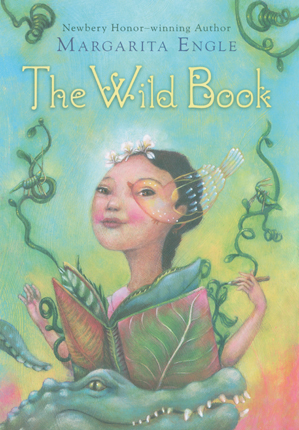Full Text Reviews: School Library Journal - 03/01/2012 Gr 5–9—This novel in verse is about a girl growing up with dyslexia in early 20th-century Cuba. Family love and the chaos that comes with large families are mixed with historical tidbits about Cuba after its wars for independence from Spain. Engle uses words sparingly and with grace: "…I love the way poetry/turns ordinary words/into winged things/that rise up/and soar!" In other poems, the protagonist's voice (based on Engle's grandmother) speaks of the struggles of learning to read and write with "word blindness," a term used to describe learning disabilities a century ago. While Fefa's great sadness over her inability to read is the primary focus, Engle includes rich cultural details and peeks into a time in which bandits roamed the countryside and children were often captured and held for ransom. Throughout all the drama, poetry is an integral part of daily life, in the play of children and the entertainment of adults, solace to Fefa in her struggle, and even as a means of expression by a kidnapper-poet. The idea of a wild book on which to let her words sprout is one that should speak to those with reading difficulties and to aspiring poets as well.—Wendy Smith-D'Arezzo, Loyola College, Baltimore, MD - Copyright 2012 Publishers Weekly, Library Journal and/or School Library Journal used with permission. Booklist - 03/01/2012 Diagnosed as having “word blindness,” 11-year-old narrator Josefa, affectionately known as Fefa, struggles with reading and records her frustrations in this diary. Danger lurks in the 1912 Cuban countryside. Bandits rustle cattle and threaten to kidnap children. Her brother accidentally shoots himself, and the farm manager writes an “ugly” poem for Fefa that makes her feel uncomfortable. She eventually learns to read and triumphantly declares, “I am surprised to discover / that I can no longer bear / the thought of an entire day / without the natural flow / of twining / vinelike words.” Written in free verse and inspired by family stories, the slender narrative conveys the frustrations of dyslexia and captures the lush setting. On the minus side, Fefa’s family members never emerge as distinct characters. Sprinkled with references to Cuban and Nicaraguan poetry, this lyrical glimpse of early twentieth-century Cuba will enrich multicultural studies. - Copyright 2012 Booklist. Bulletin for the Center... - 05/01/2012 This lyrically composed novel in verse, based on the life of the author’s grandmother, is set in Cuba in 1912, when eleven-year-old Fefa is first diagnosed with “word blindness,” or dyslexia. While the doctor treats the diagnosis as an irrevocable and untreatable scar, Mamá responds by giving Fefa a blank book and the instructions to use it for writing: “Throw wildflower seeds/ all over each page . . . Let the words sprout/ like seedlings,/ then relax and watch/ as your wild diary/ grows.” It is not an easy task: Fefa is mocked by her siblings, dizzied by the glowing white pages, and frightened about the possible consequences of her inability to read. In the end, however, Fefa’s slow and observant style of reading saves the family from a dangerous situation. The plotting, though carefully constructed, is secondary here to the remarkable, intimate depiction of Fefa’s struggle with dyslexia; Engle is masterful at using words to evoke this difficulty, and even those readers unfamiliar with the condition will understand its meaning through her rich use of imagery and detail (“The skin of a frog/feels just as slippery/and tricky as a wild/inky word”). An author’s note provides information about the real life Josefa de la Caridad Uría Peña as well as some basic information about dyslexia. HM - Copyright 2012 The Board of Trustees of the University of Illinois. Loading...
|



